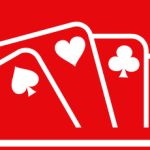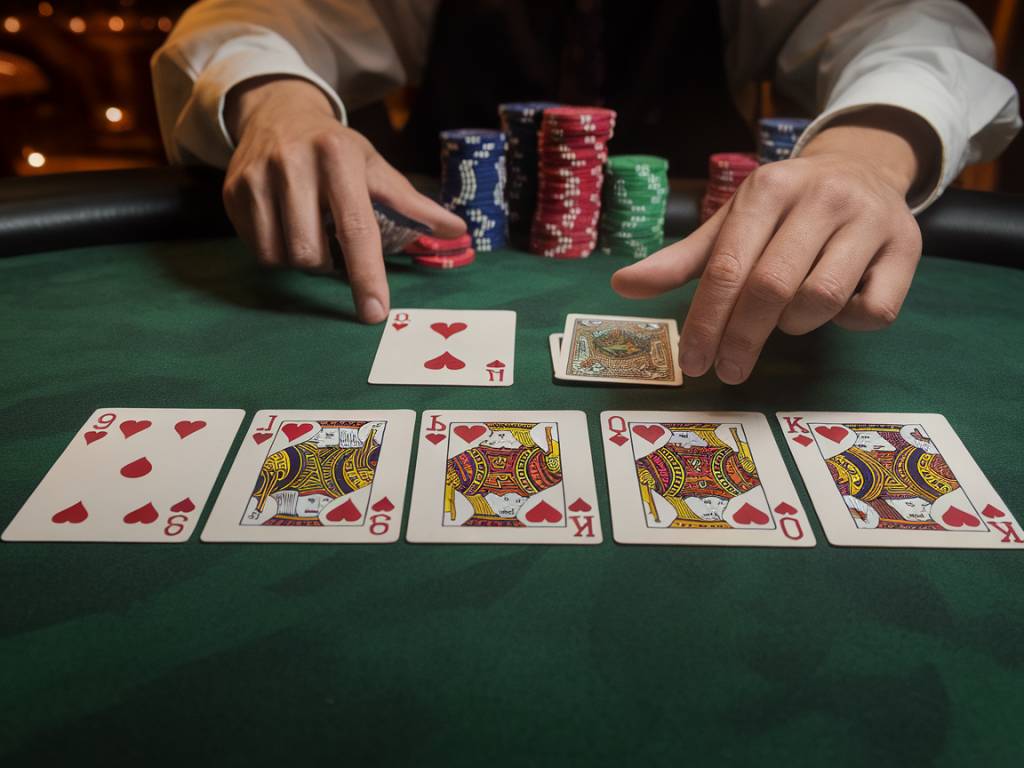Hey there, poker enthusiasts!🎲 I’m Ramy, your go-to guy for all things poker and casino. If you’re here, you’re probably scratching your head over one of the most common questions in Texas Hold’em: « Does a flush beat a straight? » Well, you’ve come to the right place! Let’s dive into the intriguing world of Texas Hold’em hand rankings and unravel the secrets of poker hands. 🃏
Understanding Poker Hand Rankings 🌟
First things first, understanding poker hand rankings is crucial if you want to play Texas Hold’em effectively. Each hand in poker has a specific rank, and knowing which hands beat others can be the difference between winning a massive pot or folding when you should’ve stayed in.
In Texas Hold’em, there are ten different hands you can form. Let’s review them from the highest-ranking to the lowest:
- Royal Flush: A, K, Q, J, and 10, all of the same suit.
- Straight Flush: Five consecutive cards of the same suit (e.g., 7♣ 8♣ 9♣ 10♣ J♣).
- Four of a Kind: Four cards of the same rank (e.g., 9♠ 9♣ 9♦ 9♥ 2♠).
- Full House: Three cards of one rank and two cards of another rank (e.g., 8♠ 8♦ 8♣ K♠ K♣).
- Flush: Any five cards of the same suit, not in sequence (e.g., 3♣ 6♣ 9♣ J♣ Q♣).
- Straight: Five consecutive cards of different suits (e.g., 4♣ 5♠ 6♦ 7♥ 8♣).
- Three of a Kind: Three cards of the same rank (e.g., 5♣ 5♦ 5♠ 9♥ 2♣).
- Two Pair: Two cards of one rank and two cards of another rank (e.g., 8♠ 8♣ Q♥ Q♠ 5♠).
- One Pair: Two cards of the same rank (e.g., A♦ A♣ 7♠ 9♣ 4♠).
- High Card: When you don’t have any of the above hands, the highest card plays (e.g., K♠ J♠ 8♣ 4♦ 2♦).
So, Does a Flush Beat a Straight? 🧐
Yes, a flush does indeed beat a straight in Texas Hold’em. Allow me to break it down:
A Flush is any five cards of the same suit. It doesn’t matter what the ranks of the cards are, as long as they are all of the same suit. For example, 3♠ 7♠ 8♠ J♠ Q♠ is a flush. As you might have noticed, the cards are not in sequence, but this hand is still pretty powerful.
On the other hand, a Straight consists of five consecutive cards of different suits. For example, 4♠ 5♦ 6♣ 7♥ 8♠ is a straight. While a straight can be quite strong, especially if you’re bluffing or if the community cards aren’t favoring anyone, it doesn’t hold up against a flush.
Why Does a Flush Beat a Straight? 🤔
This might make you wonder why a flush, even with lower-ranked cards, beats a straight. The answer lies in the statistical rarity and difficulty of acquiring each hand. Simply put, it’s harder to get all five cards of the same suit than it is to get five consecutive cards of mixed suits.
If you think about it, the deck of cards and the randomness of the draw contributes to this rarity. The ‘strength’ of a hand in poker is often a reflection of how improbable it is to be dealt such a hand.
Strategy Tips for Flushes and Straights 💡
Both flushes and straights can be utilized effectively in gameplay. Here are some strategic tips:
- Flush: If you’ve got a flush draw (four cards to a flush), consider the odds and the potential payout. Sometimes, it’s worth calling a bet to see if that final card will complete your flush. Conversely, flushes can be represented (bluffed) if the board shows three cards of the same suit.
- Straight: Straights are easier to disguise than flushes because they don’t rely on cards being of the same suit. Use this to your advantage to extract value. Predicting opponents’ reactions to straights is also crucial; cautious players may fold if scare cards appear, whereas aggressive players might stay in, hoping their hand still stands.
How Do Ties Work Between Flushes and Straights? 🥊
Ties can happen in poker, and understanding how they are resolved is vital:
- Flush Ties: If two players have flushes, the winner is determined by the highest card in the flush. If the highest cards are the same, then the second highest card is considered, and so forth.
- Straight Ties: When two straights are compared, the hand with the highest-ranking top card wins. For instance, a straight of 5-6-7-8-9 beats a straight of 4-5-6-7-8.
A Closer Look at Straight Flushes and Royal Flushes 👑
It wouldn’t be fair to close this discussion without mentioning the two granddaddies of poker hands – the straight flush and the royal flush.
- Straight Flush: This hand is even rarer than a flush or a straight because it combines both concepts. An example is 4♠ 5♠ 6♠ 7♠ 8♠. It’s an extraordinarily strong hand that beats anything except a royal flush.
- Royal Flush: The absolute best hand in poker, undisputedly. A, K, Q, J, and 10 all of the same suit. Having this hand means you’re unbeatable in that round – a reason to celebrate for sure! 🎉
Final Thoughts 📝
Knowing hand rankings like the back of your hand (pun intended) is crucial for any budding poker player. Whether you’re a novice sitting down at a poker table for the first time, or an experienced player honing your strategy, understanding why a flush beats a straight gives you a tactical edge in Texas Hold’em.
Hopefully, this walk-through has clarified things for you. Time to hit the tables with more confidence! May your poker journey be as thrilling as a royal flush. Happy playing! 🃏🎉

